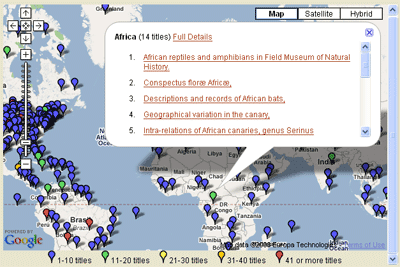Better maps! More bibliographic detail!
Following some excellent suggestions gathered at a recent Encyclopedia of Life meeting, we’ve made changes to our Google Maps browse interface. To recap, we take Library of Congress Subject Headings and geocode and map them using the Google Maps API (details here).
Now that we’re managing nearly 10,000 volumes the standard Google Maps interface was getting cluttered and clunky, so we’ve refined the interface to show smaller points, weight the results using color, and display links to the titles for a given subject heading within the map itself (as demonstrated for “Africa” above). To view the map in full, visit http://www.biodiversitylibrary.org/browse/map.
We made another change based on requests to view full bibliographic details for a scanned title. When we harvest scans from the Internet Archive, we copy the MARCXML for the title to our servers and siphon off just enough of the metadata to facilitate our browse & search capabilities – to pull in the contents of the entire MARCXML would unnecessarily bloat our database with info we don’t expect to search across or expose via browse. But, it’s important data to have in the display, so we’ve skinned the MARCXML using XSLTs provided by the Library of Congress. To view in action, click the “Brief|Detailed|MARC” links at http://www.biodiversitylibrary.org/bibliography/1583, or for any title in our collection.
Finally, we’ve enhanced the display for our Discovered Bibliographies to return results in a more performant way, providing more visual feedback to the user that processes are at work. To view the refined interface, visit the result for Pomatomus saltatrix at http://www.biodiversitylibrary.org/name/Pomatomus_saltatrix.






Leave a Comment